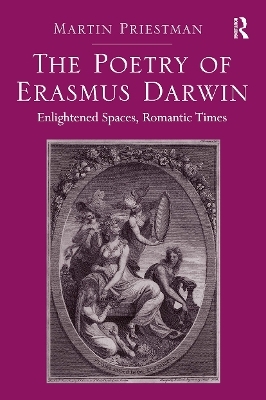
The Poetry of Erasmus Darwin
Enlightened Spaces, Romantic Times
Seiten
2024
Routledge (Verlag)
978-1-032-92208-9 (ISBN)
Routledge (Verlag)
978-1-032-92208-9 (ISBN)
In his study of Erasmus Darwin’s major poetry, Priestman situates his literary works and Darwin himself within a network of other scientists, writers, thinkers and social movers and shakers. Positing a significant shift from the Enlightenment’s emphases on conceptual spaces to the Romantic period’s emphases on historical time, Priestman gives Darwi
While historians of science have focused significant attention on Erasmus Darwin’s scientific ideas and milieu, relatively little attention has been paid to Darwin as a literary writer. In The Poetry of Erasmus Darwin: Enlightened Spaces, Romantic Times, Martin Priestman situates Darwin’s three major poems - The Loves of the Plants (1789), The Economy of Vegetation (1791) and The Temple of Nature (1803) - and Darwin himself within a large, polymathic late-Enlightenment network of other scientists, writers, thinkers and social movers and shakers. Interpreting Darwin’s poetry in terms of Darwin’s broader sense of the poetic text as a material space, he posits a significant shift from the Enlightenment’s emphases on conceptual spaces to the Romantic period’s emphases on historical time. He shows how Darwin’s poetry illuminates his stance toward all the major physical sciences and his well-formulated theories of evolution and materially based psychology. Priestman’s study also offers the first substantial accounts of Darwin’s mythological theories and their links to Enlightenment Rosicrucianism and Freemansonry, and of the reading of history that emerges from the fragment-poem The Progress of Society, a first-ever printed edition of which is included in an appendix. Ultimately, Priestman’s book offers readers a sustained account of Darwin’s polymathic Enlightenment worldview and cognate poetics in a period when texts are too often judged by their adherence to a retrospectively constructed ’Romanticism’.
While historians of science have focused significant attention on Erasmus Darwin’s scientific ideas and milieu, relatively little attention has been paid to Darwin as a literary writer. In The Poetry of Erasmus Darwin: Enlightened Spaces, Romantic Times, Martin Priestman situates Darwin’s three major poems - The Loves of the Plants (1789), The Economy of Vegetation (1791) and The Temple of Nature (1803) - and Darwin himself within a large, polymathic late-Enlightenment network of other scientists, writers, thinkers and social movers and shakers. Interpreting Darwin’s poetry in terms of Darwin’s broader sense of the poetic text as a material space, he posits a significant shift from the Enlightenment’s emphases on conceptual spaces to the Romantic period’s emphases on historical time. He shows how Darwin’s poetry illuminates his stance toward all the major physical sciences and his well-formulated theories of evolution and materially based psychology. Priestman’s study also offers the first substantial accounts of Darwin’s mythological theories and their links to Enlightenment Rosicrucianism and Freemansonry, and of the reading of history that emerges from the fragment-poem The Progress of Society, a first-ever printed edition of which is included in an appendix. Ultimately, Priestman’s book offers readers a sustained account of Darwin’s polymathic Enlightenment worldview and cognate poetics in a period when texts are too often judged by their adherence to a retrospectively constructed ’Romanticism’.
Martin Priestman is Professor of English and Co-Director of the Centre for Research in Romanticism at the University of Roehampton, UK.
Introduction; 1: Dr Darwin, the Everything; 2: Enlightened Spaces: Darwin's Visual Poetics; 3: Texts and Gardens; 4: Plants; 5: Machinery; 6: Matter (1): Evolution; 7: Matter (2): Bodies and Minds; 8: Myths; 9: Aesthetics, Sex, Myths and History: Darwin and Richard Payne Knight; 10: Politics; 11: Romantic Times (1): Blake, Coleridge, Wordsworth; 12: Romantic Times (2): Later Romantics and Women Poets; Conclusion
| Erscheinungsdatum | 16.10.2024 |
|---|---|
| Verlagsort | London |
| Sprache | englisch |
| Maße | 156 x 234 mm |
| Gewicht | 598 g |
| Themenwelt | Geisteswissenschaften ► Sprach- / Literaturwissenschaft ► Anglistik / Amerikanistik |
| Geisteswissenschaften ► Sprach- / Literaturwissenschaft ► Literaturgeschichte | |
| Geisteswissenschaften ► Sprach- / Literaturwissenschaft ► Literaturwissenschaft | |
| ISBN-10 | 1-032-92208-7 / 1032922087 |
| ISBN-13 | 978-1-032-92208-9 / 9781032922089 |
| Zustand | Neuware |
| Haben Sie eine Frage zum Produkt? |
Mehr entdecken
aus dem Bereich
aus dem Bereich
Poetik eines sozialen Urteils
Buch | Hardcover (2023)
De Gruyter (Verlag)
59,95 €
Buch | Softcover (2024)
belleville (Verlag)
20,00 €


